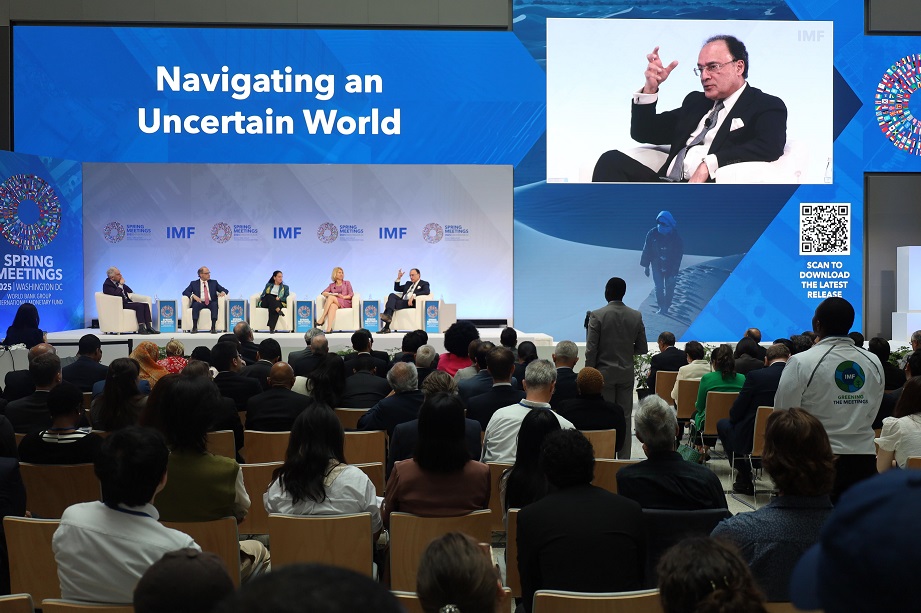Washington/Islamabad: During the fifth day of the Spring Meetings of the International Monetary Fund (IMF) and World Bank in Washington, D.C., Finance Minister Senator Muhammad Aurangzeb engaged in a series of high-level discussions to advocate for climate resilience, enhance foreign investment, and push for regional economic integration.
A major highlight of the day was his participation in the high-level dialogue of the Fund for Responding to Loss and Damage (FRLD), where he called for the swift operationalization of the Loss and Damage Fund.
Senator Aurangzeb emphasized that climate change remains an existential threat to Pakistan, referencing the catastrophic floods of 2022.
He stressed that the fund should be disbursed efficiently with mechanisms that ensure simplicity, agility, and accountability to support vulnerable nations.
MIGA
In a meeting with Mr. Hiroshi Matano, Executive Vice President of the Multilateral Investment Guarantee Agency (MIGA), the Finance Minister expressed appreciation for MIGA’s role in resolving the Star Hydro project dispute.
He assured MIGA of Pakistan’s support for a potential trade finance facility and welcomed its forthcoming mission to Pakistan, hoping to finalize agreements within the year.
Later, in a meeting with Mr. Thomas Lersten from the U.S. State Department, Senator Aurangzeb thanked the U.S. for its engagement in the recent Pakistan-hosted Minerals Conference.
He reaffirmed Pakistan’s commitment to deeper trade ties and expressed hope that a high-level trade and investment delegation would visit the U.S. soon to resolve outstanding tariff issues.
IFC
The Finance Minister also engaged with Mr. Makhtar Diop, Managing Director of the International Finance Corporation (IFC), where he highlighted Pakistan’s improving macroeconomic stability, citing the recent credit rating upgrade by Fitch.
He urged the IFC to accelerate advisory work on the Karachi Airport privatization project and called for support in building subnational governance capabilities.
In a separate engagement with Mr. Jim Barrows and senior representatives from the United States Export-Import (EXIM) Bank, Senator Aurangzeb discussed Pakistan’s fiscal consolidation efforts and macroeconomic gains, including recent IMF agreements under the Extended Fund Facility (EFF) and Resilience and Sustainability Facility (RSF).
Reko Diq
He also provided updates on the Reko Diq project and sought enhanced U.S. investment support through EXIM Bank, reiterating the need to resolve tariff-related issues.
At a session with executives from JP Morgan Chase, the Finance Minister outlined Pakistan’s stable economic outlook and the government’s intention to diversify markets.
Read More: IMF, World Bank, Meetings: Pakistan eyes capital markets return
He highlighted Pakistan’s plan to return to global capital markets with the upcoming launch of a Panda Bond—its first-ever bond issuance in the Chinese market.
During a panel discussion hosted by the IMF titled “Navigating an Uncertain World”, Senator Aurangzeb emphasized the necessity of shifting from an import-substitution model to export-led growth.
He identified the IT sector as a central pillar in this transformation and stressed the importance of regional trade integration and diversification across markets and industries in response to global economic uncertainties.
The Finance Minister also met with Mr. Dev Jagadesan, Acting CEO of the U.S. International Development Finance Corporation (DFC), to discuss project pipelines, including the strategic Reko Diq initiative, and broader avenues for U.S.-Pakistan development cooperation.
In another diplomatic engagement, Senator Aurangzeb held discussions with Baroness Jenny Chapman, the UK’s Minister of State for International Development.
WB CPF
He expressed gratitude for the UK’s long-standing support and briefed her on the World Bank’s 10-year Country Partnership Framework (CPF) for Pakistan, which emphasizes climate resilience and population strategies.
He also highlighted Pakistan’s use of technology to enhance tax administration and praised the UK’s REMIT initiative for improving development assistance transparency and tracking.
Also Read: IMF Reduces Pakistan GDP Growth Projection to 2.6%
Through these engagements, Finance Minister Aurangzeb presented Pakistan as a country on a stable economic trajectory, committed to climate action, structural reform, and international collaboration.
